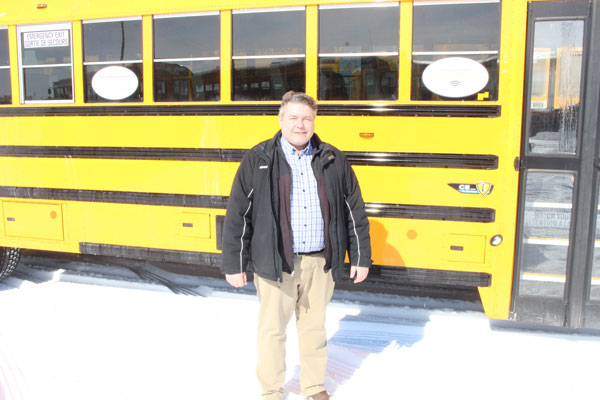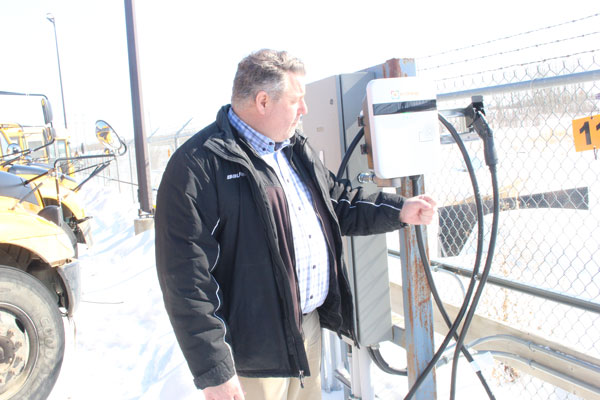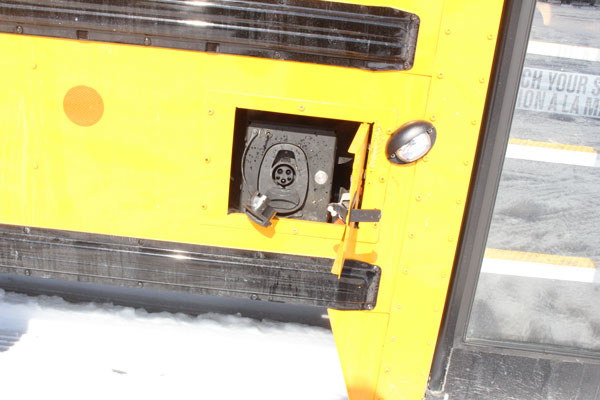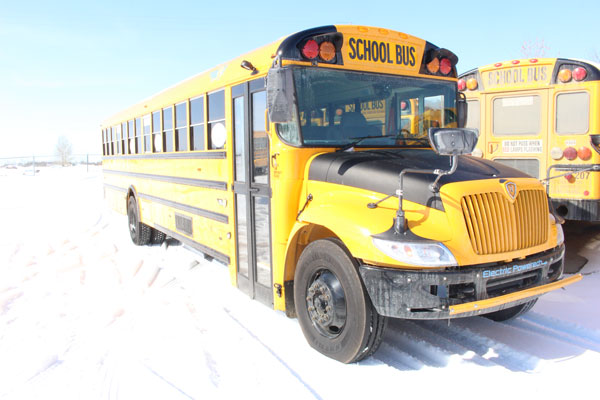
The Saskatchewan Rivers School Division is part of a first.
The division will have the use of an EV Bus Pilot Project for a period of time to collect information on how an electric bus works in a Saskatchewan winter.
According to Ryan Bruce Manager of Transportation Services, the pilot project came from discussions with their bus supplier Western Canada Bus Sales from Regina.
“They had a gentleman in Canada that’s a Vice President of E Mobility for the company from the States and he just (said), ‘we would love to give you a bus to try out,’” Bruce explained. “We dealt with them for a few months and it’s finally happening.”
The bus officially arrived at the division’s Bus Maintenance Facility on Tuesday morning. The bus was shipped from Michigan to Saskatoon on a flatbed. On arrival, officials inspected it to make sure it was roadworthy for Saskatchewan.
Bruce said they made a few minor modifications to make it legal to run on Saskatchewan roads. They still have a few more minor changes to make before it can start picking up students.
“Even something as simple as with the charging station—we have got the charging station here now but the breaker that we need for it we can’t get them in Prince Albert,” he explained. “We have to order that from outside and get that shipped in, and I’m not sure how long that will take. (It’s) just small things like that can sure add a lot of time to something.”

Bruce hopes the delay won’t keep the bus from running during colder temperatures, since that’s the primary data the company needs.
“This is probably the only time you will hear me say that I am hoping for a little bit of cold weather,” he said. “We don’t want it to be too warm for us. Some -25 C (weather) would be nice. Of course, personally, I don’t want that, but it would be nice to be able to run the bus.”

The charging station is not completely set up and there is still some training to do before it can get on the road. Bruce said they’re eagerly awaiting that opportunity.
“We are just excited to be able to try out an electric bus in Saskatchewan. We will be the first school division in Saskatchewan to have one, so we will get to get a feel for the range and the pros and cons of it,” he said.
The project is very informal, Bruce said, and there are no set criteria from the company beyond finding out how the buses react to Saskatchewan weather.
“We don’t even know how long we have it,” he explained. “We will just put it to use and see what data we can get from it.”

The bus will carry Red Wing School students north of Prince Albert, but will be plugged in and charged daily in the city. Bruce said they selected the Red Wing route because it was a long enough route to get good data on, but not too long for the battery.
“We will get a little bit of rural experience and a little more mileage on it than you would see in the city, then park back here during the day, and then again back out to Red Wing for the afternoon,” Bruce explained.
“We don’t want that battery to get too low because we have no experience with it, so we are being very cautious. We don’t want to put it on one that will use 80 per cent of the battery. We want to put it on one that is going to use 40 or 50 per cent so a pretty nice buffer.”
The route will be going through the city to get to the Red Wing route.
“A fair bit of city and a little bit of highway and a few grid roads as well,” Bruce said.
Western Canada Bus Sales provided some information such as battery range and other data. That allowed Sask. Rivers to identify the routes that would work best.
“It was important or essential that the bus has to be here (in Prince Albert),” Bruce said. “We can’t put a charging station out in the middle of nowhere so it has to start from here. It has got to be a specific or a fairly tight range of kilometres on it during the day and so from that we were able to narrow it down which routes would be ideal for it.”
Bruce said the division’s transportation department lacks experience in dealing with electric buses. This pilot project will allow maintenance workers to get more familiar it.
“Like most everyone else here in Saskatchewan we really have no experience and no knowledge of what this really is going to look like or what to expect,” he explained. “Now that we have some information on it, and (are) getting more. We have got some people coming in from B.C. actually to do some training for our techs and our driver, and again, this is all at Western Canada’s cost. It’s ideal.”
The division gets the advantage of using the bus and Western Canada gets the advantage of them using the bus to provide information.
“As you can imagine, it is loaded with telemetry that is going to feedback data to the company and there is probably a lot more than I will be able to tell you with GPS data and power usage and how it’s performing under different circumstances even so far as its breaking. It is going to be able to read everything from that bus,” Bruce said.
Bruce said the idea of building an electric vehicle fleet is still a long way off in the horizon, but this pilot project will provide helpful information for the future.
“There is a lot of talk about electric vehicles. They are coming. They are getting more and more common and the day is going to come when there is going to be some talk about why don’t we have electric school buses,” Bruce explained. “Well, we will have that knowledge to be able to say, ‘here is what we found. Here is how they operate in Saskatchewan.’”
The idea of electric school buses could become a subject at the level of the Saskatchewan School Boards Association or Saskatchewan Teachers Federation. Bruce said that Saskatchewan Rivers, as an urban and rural division, could provide essential knowledge.
michael.oleksyn@paherald.sk.ca

